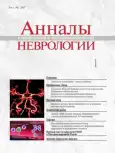Vol 1, No 1 (2007)
Original articles
Cerebrovascular pathology: results and perspectives
Abstract
The article summarizes results of longgterm investigations performed in the Institute of Neurology RAMS in most actual problems of cerebrovascular disorders. The conception of heterogeneity of ischemic stroke is presented and key mechanisms of local brain ischemia are shown. Confirmed is the efficacy of the multidisciplinary approach to study of this problem which defined the formation of new research topics: cardioneurology, hemostasiology in cerebrovascular disorders, restorative neurology and neurorehabilitation. Perspectives of further developpment of this actual field of modern medicine are outlined.
 10-16
10-16


Stroke intensive care: voice a view
Abstract
Modern methods of acute stroke treatment are analyzed: traditional and mechanical thrombolysis, intraventricular thrombolysis, recombinant activated factor VIIa for acute intracerebral hemorrhage, hemicraniectomy. Special attention on the problems of cerebral perfusion pressure and multiple organ dysfunction syndrome (MODS) is concentrated. Future perspectives in acute stroke are discussed.
 17-22
17-22


Heterogeneity of sporadic Parkinson’s disease: molecular approach to solving the problem
Abstract
We performed search for mutations in the LRRK2, PRKN (parkin) and SNCA (a-synuclein) genes in 359 patients of Slavonic ethnic origin (169 men and 190 women) with Parkinson’s disease, of whom 345 represented sporadic cases. Age at the disease onset was from 23 to 84 years, and patients with juvenile parkinsonism (debut of symptoms before 20 years) were excluded from enrollment. On study of a major mutation G2019S in the gene LRRK2 as well as of structural rearrangements in the PRKN and SNCA genes it was established that in Parkinson’s disease the frequency of these mutations is 7.5% (27 patients of 359). The mutation LRRK2-G2019S was found in 1.1% of patients, parkin gene exonic rearrangements in 5.8% (including 10.7% patients with an early form of Parkinson’s disease and 1.7% patients with a late form of the disease), and SNCA gene duplication in two patients. The performed analysis showed marked heterogeneity of the molecular structure of Parkinson’s disease in Russian population, which allows to consider this disorder not to be a unified form but rathera group of separate (although similar) neurodegenerative syndromes. The identification of inherited mutations in a part of sporadic cases of Parkinson’s disease changes significantly the familial prognosis and requires genetic counseling in persons from the ‘high risk’ group.
 23-31
23-31


Multiple sclerosis: modern conception of pathogenesis and treatment
Abstract
The current conception is that multiple sclerosis pathogenesis comprises an initial inflammatory phase, followed by a phase of demyelination and, last, a neurodegenerative phase. The mechh anisms of inflammatory reactions and axonal loss have been disscussed. The crucial role of the immune system in disease pathogenesis has important therapeutic implications. The immunological effects of glucocorticosteroids underlie the beneficial effect on multiple sclerosis relapse. Two classes of immunomodulators (interferon β, glatiramer acetate) are approved for long term treatment of multiple sclerosis. Immunosuppressive agents and immunoglobulins used in treatment have been shown to exert immunomodulatory effects. Future developments of multiple sclerosis therapy have been discussed.
 32-40
32-40


Dissection of cervico-cerebral arteries and cerebrovascular disease
Abstract
Review of the literature and the author’s own experience on the dissection of cervico-cerebral arteries leading to ischemic stroke and transient ischemic attacks are presented. Discussed are issues of etiology, clinical picture, differential diagnosis and treatment of this from of pathology of cervico-cerebral arteries. Special attention is paid to modern possibilities of non-invasive in vivo diagnosis of dissection of cervico-cerebral arteries on the basis of newest methods of computerized neuro- and angioimaging.








